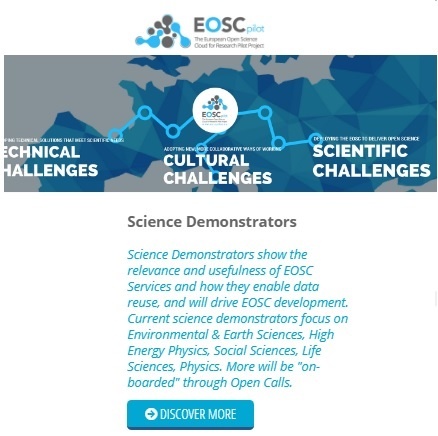European Open Science Policy Platform (OSPP) : some updates
11/07/2017


(Source: EOSC Pilot)
The Open Science Policy Platform (OSPP; 2016–2018) has recently adopted consensual reports on the European Open Science Cloud governance and on Open Access Publishing in Europe. This latter gives recommendations on how to implement open access (OA) publishing in Europe by 2020. Moreover, the EOSC has also recently selected Demonstrators/Projects on the EOSCpilot that started on July 1, 2017...
|
... Other updates :
|
The OSPP's work
is organised around eight action areas that the European Commission has highlighted as important for Open Science to flourish:
- FAIR open data
- The European Open Science Cloud
- Altmetrics
- New business models for scholarly communication
- Rewards
- Research integrity
- Open science skills
- Citizen science
During the third meeting of the OSPP (20 March 2017), the OSPP adopted consensual reports on the European Open Science Cloud and on Open Access Publishing. A first discussion on the final report of the Expert Group on Altmetrics took place. The OSPP is scheduled to adopt a report on the subject matter at the following fourth meeting of the OSSP on 13 October 2017. The new working groups are: Altmetrics, Rewards, and Skills. There will also be a discussion on the Code of Conduct on Research Integrity held at the meeting.
Key takeaways on open science publishing (from the Open Access Publishing in Europe report):
|
The European Open Science Cloud (EOSC)
|
“We must create infrastructure. Europe’s final transition must be one from fragmented datasets to an integrated European Open Science Cloud. By 2020, we want all European researchers to be able to deposit, access and analyse European scientific data through a European Open Science Cloud”, |
"The high-level European Open Science Cloud Summit (12 June, 2017, Brussels, Belgium) was designed to be Europe’s moment of commitment to the EOSC and to generate a number of concrete EOSC Statements for implementation. By reviewing key areas of EOSC implementation and endorsing the EOSC statements, participants commited to making the EOSC a reality by 2020. As a clear marker of willingness to build the EOSC as an inclusive and sustainable open commons for Europe’s research and innovation system, the meeting was hugely important", - OpenAIRE’s input statement at EOSC Summit, Brussels, 12 June 2017.
# EOSC Summit: The European Open Science Cloud – The New Republic of Letters (Carlos Moedas, SPEECH, 12 June 2017).
#Europe joins forces to create largest ever shared data repository for researchers (HORIZON, The EU Research & Innovation Magazine, 15 June 2017).
|
Selected Projects on the EOSCpilot First Call for Science Demonstrators The First Call for Science Demonstrators to the EOSCpilot received 30 applications from 86 institutions in 19 countries, with challenging projects that would help to define the infrastructure needed by European researchers, while showing the scientific excellence and societal impact that could be achieved by EOSC. Following peer review, 5 of these proposals were selected to receive 12 months support starting from 1 July 2017. Learn more about selected proposals |
Related:
- 26 July : Webinar : FAIRdata Community Session
- The main outcomes of the BlueBRIDGE April workshop “FAIR Friendly Research Data Catalogue: how far are we?” are now available in this Report
- Realising the European Open Science Cloud (First report and recommendations on the European Open Science Cloud of the Commission High Level Expert Group, 2016)
- Save the date: Open Science Conference 2018, 13 to 14 March 2018, Berlin
- Open Science in a European Perspective (Ron Dekker, Director CESSD, slides, 2017)
- Promoting Open Science through ethical and efficient Sharing of Genomic Data for Research
